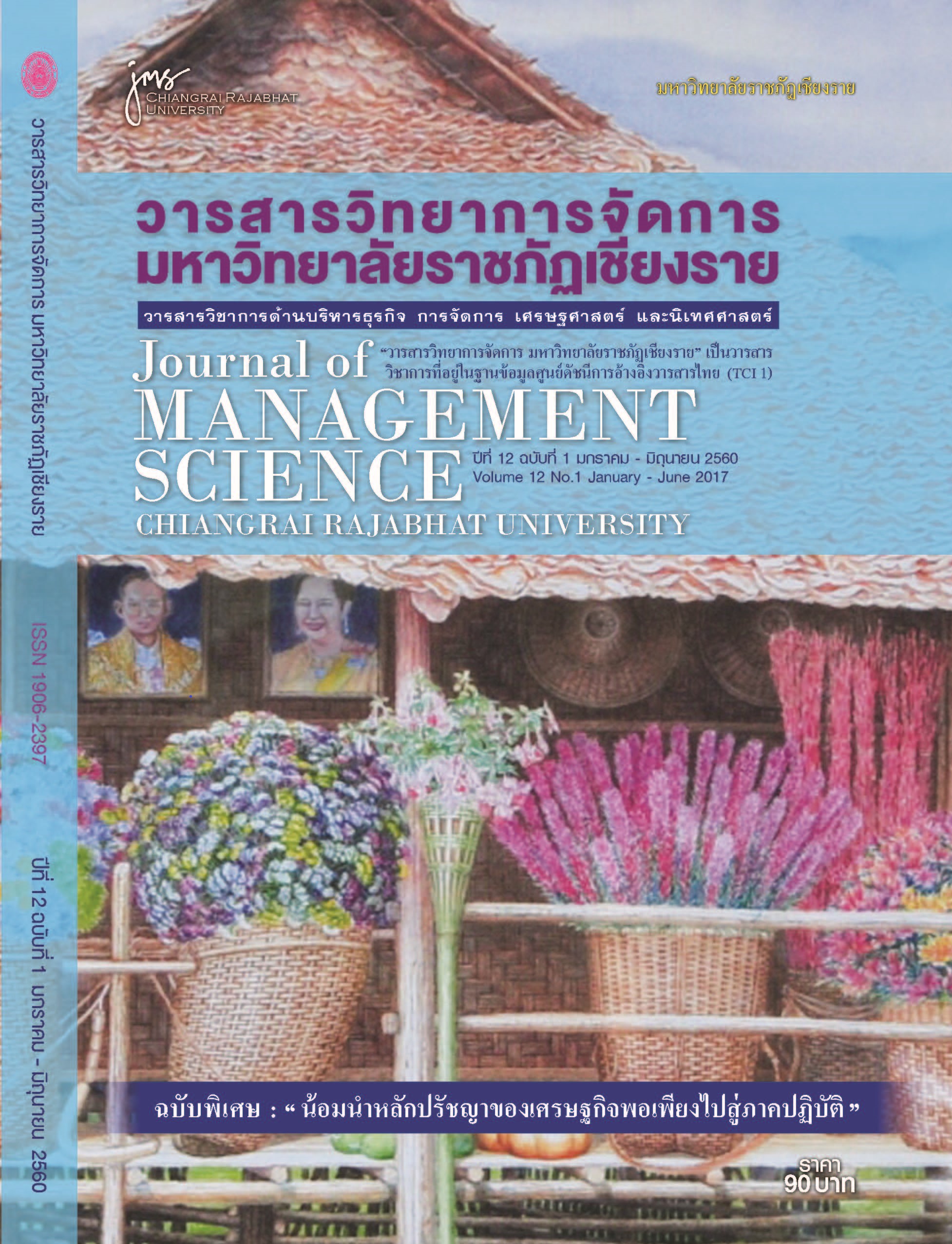The Pattern of Factors Contributing to the Success of Organic Thai Jasmine Rice Growers in Chiang Rai, Phayao, and Chiang Mai Provinces
Main Article Content
Abstract
The research entitled The Pattern of Factors Contributing to the Success of Organic Thai Jasmine Rice Growers in Chiang Rai, Phayao, and Chiang Mai Provinces had three objectives 1) to study the success of Organic Thai Jasmine Rice Growers and, 2) to study the pattern of factors contributing to the success of Organic Thai Jasmine Rice Growers. The research involes Multi-Method of quantitative and qualitative were employed. For quantitative research, the questionnaire was used for data collection from 200 famers’samplings on descriptive statistics to analysis ,stepwise multiple regression analysis, and hypothesis testing with significant P-value. For qualitative research, the data were collected using the informal interview with 15 farmers. The research findings were as follows: 1. The success of Organic Thai Jasmine Rice Growers in Chiang Rai, Phayao, and Chiang Mai were found that their social and economic status were improved, they had an opportunity to expand business, and had interaction with joint venture. 2. The Pattern of Factors Contributing to the Success of Organic Thai Jasmine Rice Growers were found that the farm management factor had the highest predicting power followed respective the acceptance of innovation and technology, and the knowledge management factor. The conducted study provided an important policy recommendation, the farmer should be the correct farm management process upon academic principles will be the important mechanism supporting development of Organic Thai Jasmine Rice quality at upstream level and it is also able to reduce the production cost. As a result, the related organizations must emphasize on providing knowledge on farm management to famers continuously in order to enable them to build correct knowledge.
Article Details
Views and opinions expressed in the journal do not necessarily reflect those of the editors.
References
กระทรวงพาณิชย์. (ม.ป.ป). เกษตรอินทรีย์ในประเทศไทย (Thai Organic Agricultural). ค้นเมื่อ 30 มิถุนายน 2558, จาก
www.organic.moc.go.th.
ข่าวเกษตร. (2558). ความสำเร็จของกองทุนข้าวสุรินทร์. ค้นเมื่อ 25 เมษายน 2558, จาก https://www.ricefund.com/.
คลังข้อมูลสารสนเทศและการสื่อสาร. (2553). ระบบเกษตรอินทรีย์มาตรฐาน. ค้นเมื่อ 12 เมษายน 2558, จาก https://www.
stou.ac.th/thai/grad_stdy/.
จิตฐิพร ศิริตานนท์. (2543). การเปรียบเทียบค่าความเชื่อมั่นและความเที่ยงตรงเชิงโครงสร้างของแบบวัดเจตคติต่อวิชาคอมพิวเตอร์. กรุงเทพฯ: มหาวิทยาลัยรามคำแหง.
จิรวรรณ โรจนพรทิพย์. (2556). เทคโนโลยีชาวบ้าน. ค้นเมื่อ 28 เมษายน 2558, จาก https://www. technologychaoban.com/
/news_detail.php?tnid= 621§ion.
ดำริ ถาวรมาศ. (2552). การใช้ปุ๋ยบำรุงดิน. ค้นเมื่อ 22 เมษายน 2558 จาก https://www. doa.go.th.
เทพ เพียมะลัง. (2556). การเข้าสู่มาตรฐานคุณภาพข้าวสูงของสมาชิกเครือข่ายเกษตรกรจังหวัดเพชรบรูณ์. รายงานการ
วิจัย คณะเทคโนโลยีการเกษตร มหาวิทยาลัยราชภัฎเพชรบรูณ์.
ธนรักษ์ เมฆขยาย. (2550). การจัดการฟาร์มเชิงธุรกิจ. เชียงใหม่: คณะเศรษฐศาสตร์ มหาวิทยาลัยแม่โจ้.
ธงชัย สันติวงษ์. (2540). พฤติกรรมผู้บริโภคทางการตลาด. กรุงเทพมหานคร: ไทยวัฒนาพานิช.
นิติพงษ์ ส่งศรีโรจน์. (2556). ความสัมพันธ์เชิงสาเหตุระหว่างการจัดการองค์ความรู้ การมีอุดมการณ์เศรษฐกิจพอเพียง
ความสามารถในการทำบัญชีครัวเรือน การจัดการฟาร์มข้าวอินทรีย์ ความสำเร็จของการจัดการฟาร์มข้าวอินทรีย์ และความมั่นคงในชีวิตของเกษตรกรในจังหวัดยโสธร. รายงานวิจัย คณะการบัญชีและการจัดการ มหาวิทยาลัยมหาสารคาม.
บุญสม วราเอกศิริ. (2549). ระเบียบวิธีวิจัย. ภาควิชาส่งเสริมการเกษตร คณะผลิตกรรมการเกษตร มหาวิทยาลัยแม่โจ้.
_________. (2539). ส่งเสริมการเกษตร: หลักและวิธีการ. พิมพ์เพิ่มเติม 2551: เชียงใหม่ ภาควิชาส่งเสริมการเกษตรมหาวิทยาลัยแม่โจ้.
บุศรา ลิ้มนิรันดร์กุล และพฤกษ์ ยิบมันตะสิริ. (2554). นวัตกรรมทางเกษตรที่สนับสนุนระบบผลิตข้าวอินทรีย์เกษตรกรรายย่อยภาคเหนือ. สำนักงานพัฒนาวิทยาศาสตร์และเทคโนโลยีแห่งชาติเครือข่ายภาคเหนือ. ภาควิชาเศรษฐศาสตร์ เกษตรและส่งเสริมเผยแพร่การเกษตร คณะเกษตรศาสตร์ มหาวิทยาลัยเชียงใหม่.
พันธ์จิตต์ พรประทานสมบัติ และศุภพร ไทยภักดี. (2552). รายงานการวิจัยเรื่อง สถานการณ์และอนาคตผักอินทรีย์ใน
ประเทศไทย. นครปฐม: ภาควิชาส่งเสริมและนิเทศศาสตร์เกษตร คณะเกษตร กำแพงแสนมหาวิทยาลัยเกษตรศาสตร์.
วิจิตร อาวะกุล. (2535). หลักการส่งเสริมการเกษตร. กรุงเทพฯ: บริษัทโรงพิมพ์ไทยวัฒนาพานิช จำกัด.
สมศักดิ์ เพียบพร้อม. (2530). หลักและวิธีการจัดการธุรกิจฟาร์ม. กรุงเทพฯ: โอ.เอส พริ้นติ้งเฮ้าส์.
สุรพงษ์ โสธนะเสถียร. (2533). การสื่อสารกับสังคม. กรุงเทพฯ: โรงพิมพ์จุฬาลงกรณ์มหาวิทยาลัย.
เสรี พงศ์พิศ. (2531). คืนสู่รากเหง้า. กรุงเทพฯ: คุรุสภา.
สำราญ สะรุโณ. แนวคิดด้านการบริหารและการจัดการฟาร์มเพื่อความสำเร็จ. ค้นเมื่อ 5 มิถุนายน 2558, จาก https://www.
fao.org/Docrep/003/Y1860E/y1860e03.htm
สำนักงานคณะกรรมการพัฒนาระบบราชการ. (2554). สาระข้าวอินทรีย์. ค้นเมื่อ 6 เมษายน 2558, จาก https://www.
khaowdee.com/local_orgfarming.php.
Bales, R.F. (1950). Interaction Process Analysis: A Method for the Study of Small Group. New York. Addison-Wesley.
Bernald, M.B. (1960). Leadership, Psychology and Organization Behavior. New York: Hill Book.
Bloom, B.S. (1975). Taxonomy of Educational Objectives. New York: David Mckay Company.
Domjan, M. (1996). The Principles of Learning and Behavior Belmont. California: Thomson Wadsworth.
Herzberg, F., Bernard, M. , & Snyderman, B. B. (1967). The Motivation to Work. New York: John Wiley & Sons.
Kidd, J. R. (1973). How Adults Learn. New York : Association Press.
Klein, S.B. (1991). Learning. New York: McGraw –Hill.
Lovell, R. B. (1980). Adult Learning. New York: Halsted Press Wiley & Son.
McShane, S. L. and Von Glinow. (2003). M. A. Organizational Behavior. New York: McGraw-Hill.
Rogers, E.M. and Shoemaker, F.F. (1962). Communication of Innovations. New York: The Free Press.
Yamane, T. (1967). Elementary Sampling Theory. Englewood Cliff. New Jersey: Prentice-Hall.


